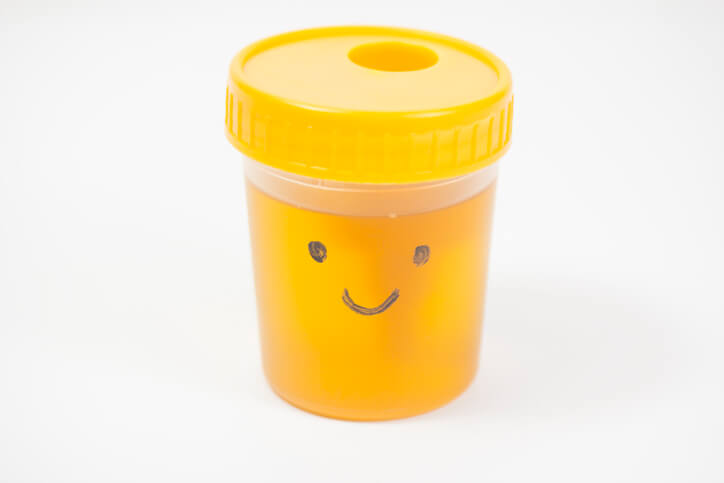5 Things Your Urine Says About Your Health
7 years ago | Toxins
By Joy Stephenson-Laws, JD, Founder
If you go to the doctor’s for a physical, you will likely be asked to provide a urine sample. Testing of the urine is called “urinalysis.” And as ‘unsexy’ as this topic is, this yellow fluid is your body’s liquid waste and can reveal a lot about your health.
For example, a urinalysis may reveal excessive glucose (sugar) in the urine. Excessive glucose may be a sign of diabetes. If there is excess protein, this may be a sign of chronic kidney disease. If excessive red blood cells are found in the urine, this could be a sign of kidney disease, kidney stones, an infection, bladder cancer or even sickle cell disease. And if excessive white blood cells are found, this could be a sign of inflammation or an infection.
You don’t always need to go to a doctor for a urinalysis in order to get answers from your urine. For example, if you look at your urine and it appears very yellow (maybe even brownish in color) this may be an indication that you are most likely dehydrated and need to drink more water. And of course, if a woman suspects she is pregnant, she can buy an at-home pregnancy test. These tests may identify human chorionic gonadotropin (hCG), a hormone that is produced during pregnancy.
So your urine is usually a very good indicator of the state of your health. More recently, there is research which suggests that urine can also tell you the toxins you have been exposed to. And this is a big deal!
“Over the course of a lifespan, from conception to death, each person encounters a wide variety of environmental stressors such as pollution, tobacco smoke, the sun's rays, pharmaceutical agents, and some constituents of food,” according to a report discussing the research.
“Evidence of the exposure and a person's ability to metabolize these stressors is all hiding in the urine.”
So exactly why is this toxin information important?
Exposure to environmental stressors can alter (essentially damage) your DNA. Basically, a major cause of DNA damage is oxidative stress. According to one source, there are 800 incidents of DNA damage in your bodies every hour (or according to another source, an estimated 10,000 DNA damage events occur every day in a single cell). And damage to your DNA is believed to accelerate aging and be the cause of many types of disease.
“It turns out, these exposures and the damage they cause [to DNA], play a major role in the body developing illnesses like cancer, Alzheimer's disease, cardiovascular disease and others,” according to the report on the new research.
The study of all of this is actually called “DNA adductomics.” To put it simply, a DNA adduct is essentially a biomarker of carcinogen (cancer-causing) exposure.
And as you can probably imagine, what you may see in one person may be markedly different than what you may see in another (due to a person’s genetic makeup and environmental factors, such as whether this person smokes and the amount of pollution he or she is exposed to). Reasons for these differences are not definitive, but this is what researchers are trying to get more clarification on through urine examination.
“This research looks to open new doors to better understand how environmental stressors affect a person's genetic makeup, why some forms of damage are repaired more easily than others, together with how the damage eventually becomes life-threatening illnesses.”
One of the lead researchers said that analyzing urine is a great way to approach this, because it is less invasive and gives a fuller picture of the DNA damage and how DNA repairs.
How Can You Be Proactive?
You can’t entirely avoid things that are toxic to you. It’s inevitable that you will be exposed to air pollution, for example. But there are things you can do to decrease DNA damage, such as avoiding smoking and being proactive about sun protection.
Additionally, one of the best things you can do to protect your DNA, reduce oxidative stress, delay aging and help prevent the development of disease is follow a nutrient-rich diet. A diet with plenty of fruits and vegetables (which contain antioxidants, like vitamin C and vitamin A) may help diminish oxidative stress in the body and help your DNA repair after being damaged. Certain vegetables may even have specific chemicals that promote DNA repair and protection against cancer. In other words, eating healthily increases your chances of getting plenty of phytochemicals, (plant chemicals), in your body which may help prevent damage to your DNA and help promote the repair process.
There is also credible medical evidence to suggest that specific minerals, like selenium, may help DNA repair. Zinc is another mineral that may protect DNA.
Be Balanced.
Maintaining nutritional balance (not having too much or too little of any essential nutrient like vitamins or minerals) is also important in preventing DNA damage and disease. Getting routine nutrient tests will determine if you have any nutrient imbalances. If you do, a competent healthcare professional can work with you to make the necessary adjustments to your diet and/or recommend quality supplements.
You can read more about nutrients, particularly as they relate to aging and disease prevention, in Minerals - The Forgotten Nutrient.
Enjoy your healthy life!
The pH professional health care team includes recognized experts from a variety of health care and related disciplines, including physicians, attorneys, nutritionists, nurses and certified fitness instructors. This team also includes the members of the pH Medical Advisory Board, which constantly monitors all pH programs, products and services. To learn more about the pH Medical Advisory Board, click here.







